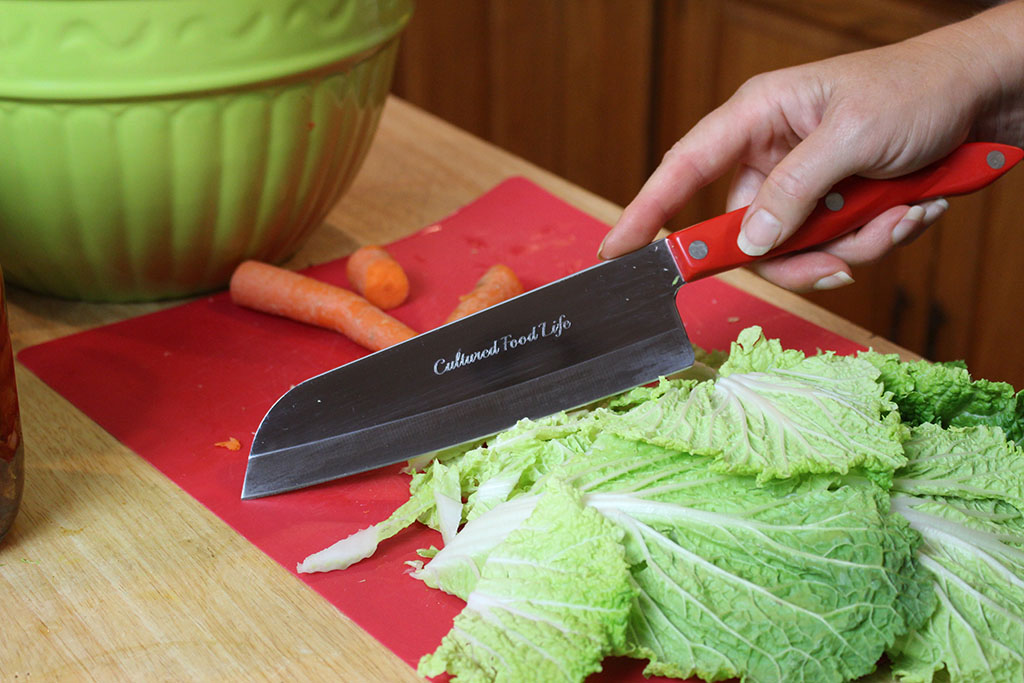
What are Cultured Vegetables?
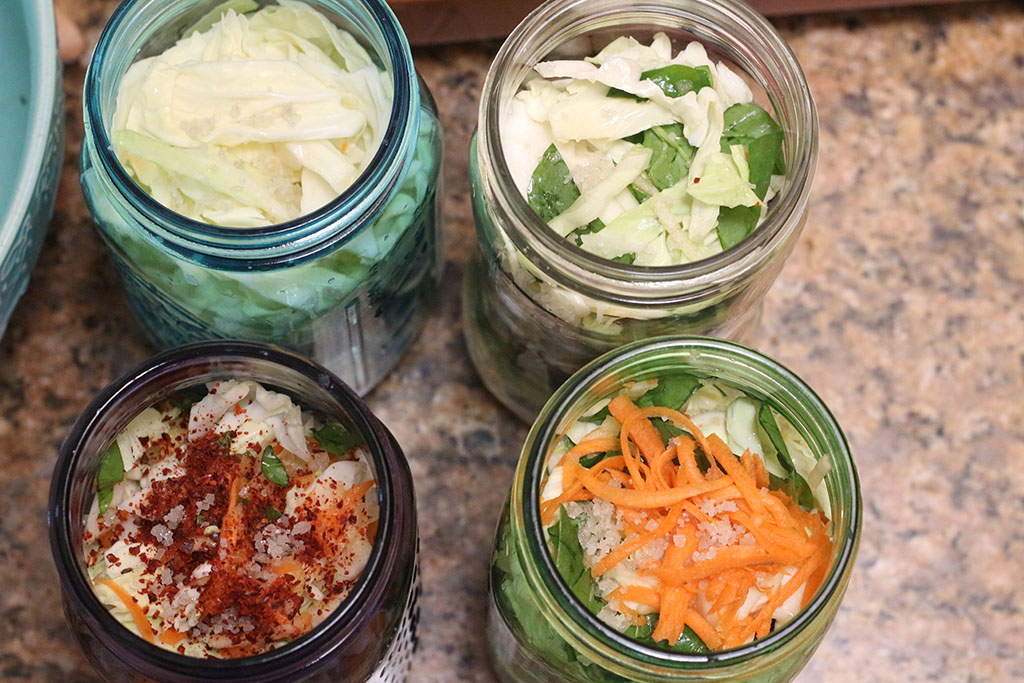
"Fermentation may have been a greater discovery than fire."
David Wallace
Forget everything you think you know about vegetables and let me tell you what happens when you culture them. Grow your own probiotics in a jar of vegetables, and you’ll be shocked and amazed at everything they can do. I feel like I’ve been standing on the top of a mountain singing the praises of cultured vegetables for years and some have listened and others not, but I knew one day there would be a tipping point and that day is almost here. My life was dramatically changed by a jar of cultured vegetables that was teeming with billions of probiotics. Cultured veggies continue to amaze me and fill me with wonder, but the help they provide can far surpass the things I have seen in myself and countless others. My everyday life is made better by eating a spoonful of these amazing vegetables. We keep a jar in our fridge at all times . . . okay, like at least six or more jars to be truthful. I like variety, what can I say? They will last for months on end. They are one of my secret weapons. I am crazy for these foods. They are more than food to me. They work like magic because of the special bacteria Lactobacillus plantarum (L. plantarum). Check out my many reasons to eat this superfood!
Reasons To Make Cultured Vegetables
Removes Pesticides
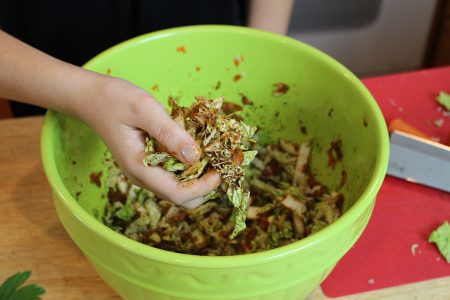 This special bacteria (L. plantarum) can help remove pesticides and chemicals not only from the veggies but inside of you too. It’s exciting that microbes can help us by removing pesticides from our vegetables. It’s often a hardship for people to always buy organic, but the healthy bacteria L. plantarum can remedy this. L. plantarum bacterial strains studied from fermented vegetables in kimchi were found to be capable of degrading four different organophosphorus insecticides by using them as a source of carbon and phosphorous.
This special bacteria (L. plantarum) can help remove pesticides and chemicals not only from the veggies but inside of you too. It’s exciting that microbes can help us by removing pesticides from our vegetables. It’s often a hardship for people to always buy organic, but the healthy bacteria L. plantarum can remedy this. L. plantarum bacterial strains studied from fermented vegetables in kimchi were found to be capable of degrading four different organophosphorus insecticides by using them as a source of carbon and phosphorous.
Adds Vitamins And Minerals
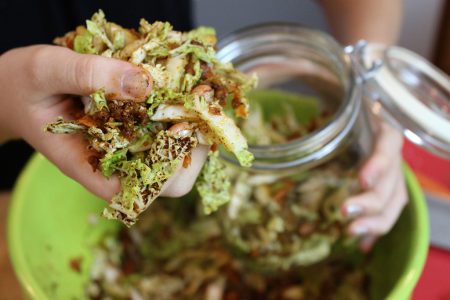 When you culture or ferment your cabbage into sauerkraut, the vitamin C and antioxidant levels go through the roof. Researchers at Cornell University tested levels of antioxidants and vitamin C in sauerkraut and found the average level of vitamin C in raw cabbage was 57 mg per cup, but when fermented the level was close to 700 mg! Vitamin C is also an antioxidant and it protects the body against stress and helps boost the immune system.
When you culture or ferment your cabbage into sauerkraut, the vitamin C and antioxidant levels go through the roof. Researchers at Cornell University tested levels of antioxidants and vitamin C in sauerkraut and found the average level of vitamin C in raw cabbage was 57 mg per cup, but when fermented the level was close to 700 mg! Vitamin C is also an antioxidant and it protects the body against stress and helps boost the immune system.
All cultured vegetables are wonderful sources of vitamin C. But cabbage, collards, and kale have the most - and when you then ferment them, you get more! Not only do you get more vitamin C when you culture your vegetables, but the fermentation process also increases the nutrient availability in vegetables. This is due to the good bacteria (microflora) that are required to digest and utilize your food.
Safest And Best Food Method To Preserve Vegetables
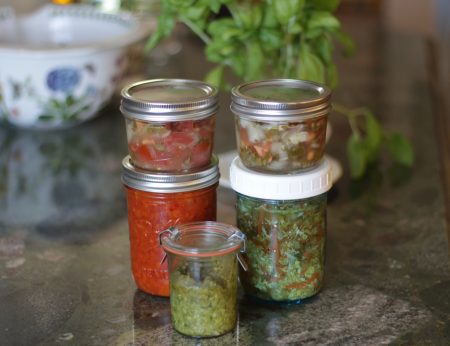 U.S. Department of Agriculture research service microbiologist, Fred Breidt, says properly fermented vegetables are actually safer than raw vegetables, which might have been exposed to pathogens like E. coli on the farm. “With fermented products, there is no safety concern. I can flat-out say that. The reason is the lactic acid bacteria that carry out the fermentation are the world’s best killers of other bacteria,” says Breidt, who works at a lab at North Carolina State University, Raleigh, where scientists have been studying fermented and other pickled foods since the 1930s.
U.S. Department of Agriculture research service microbiologist, Fred Breidt, says properly fermented vegetables are actually safer than raw vegetables, which might have been exposed to pathogens like E. coli on the farm. “With fermented products, there is no safety concern. I can flat-out say that. The reason is the lactic acid bacteria that carry out the fermentation are the world’s best killers of other bacteria,” says Breidt, who works at a lab at North Carolina State University, Raleigh, where scientists have been studying fermented and other pickled foods since the 1930s.
Breidt adds that fermented vegetables, for which there are no documented cases of food-borne illness, are safer for novices to make than canned vegetables. Pressurized canning creates an anaerobic environment that increases the risk of deadly botulism, particularly with low-acid foods.
Stomach Distress Of Any Kind
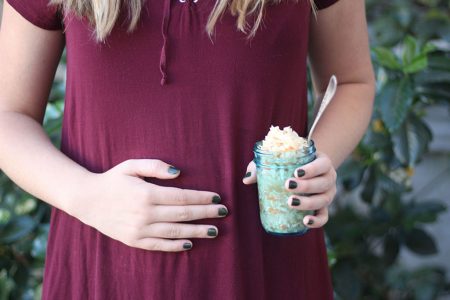 L. plantarum is pretty powerful and can even knock out food poisoning, (as I myself have witnessed). It has been studied and found successful in the inhibition of food poisoning and pathogenic bacteria, and it is being studied for use in improving the microbiological safety of foods. It’s also superior for any kind of stomach distress. I’ve seen this again and again and received so many emails with stories telling me how effective it was in stopping vomiting, stomach cramps, and nausea with just a spoonful of the brine or vegetables. Try it and it will make you a believer, too. Nothing works better for stomach distress.
L. plantarum is pretty powerful and can even knock out food poisoning, (as I myself have witnessed). It has been studied and found successful in the inhibition of food poisoning and pathogenic bacteria, and it is being studied for use in improving the microbiological safety of foods. It’s also superior for any kind of stomach distress. I’ve seen this again and again and received so many emails with stories telling me how effective it was in stopping vomiting, stomach cramps, and nausea with just a spoonful of the brine or vegetables. Try it and it will make you a believer, too. Nothing works better for stomach distress.
The Journal Of Medicinal Food Has Credited Them With The Following Benefits
Cholesterol-Lowering Activity
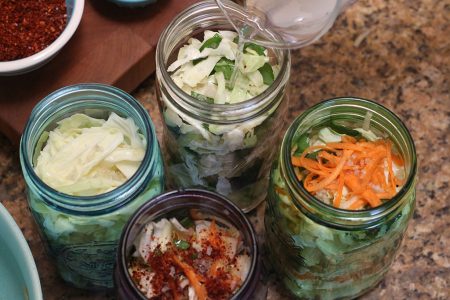 Studies have shown that L. plantarum has potential cholesterol-lowering activity.
Studies have shown that L. plantarum has potential cholesterol-lowering activity.
Researchers investigated whether this bacteria could lower LDL and reduce blood levels of cholesterol esters - molecules of cholesterol attached to fatty acids, something that accounts for most total blood cholesterol and has been tied to cardiovascular disease risk. Scientists found that L. plantarum can impact cholesterol levels in several ways, including breaking apart molecules known as bile salts.
Based on correlations between LDL reduction and bile measurements in the gut, the study results suggest L. plantarum broke up bile salts, leading to reduced cholesterol absorption in the gut and less LDL.
Strengthens The Good Bacteria, Kills Harmful Pathogens
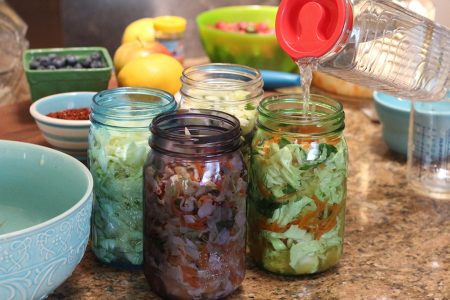 The superstar bacteria in cultured vegetables, L. plantarum, is extremely hardy, survives stomach acid with ease, and can make the full trip from your mouth – to intestines – to colon to colonize you in a powerful way. L. plantarum is a welcome guest that works mightily for you by fiercely attacking pathogenic (bad) bacteria in our bodies. It will strengthen your good bacteria by killing the bad guys, and then helps your own good bacteria grow stronger, and helps it to be more resistant to future invasions of pathogens. It’s important to note that this is a transient bacteria which means it will only last a few days in the body so it’s important to consume it often.
The superstar bacteria in cultured vegetables, L. plantarum, is extremely hardy, survives stomach acid with ease, and can make the full trip from your mouth – to intestines – to colon to colonize you in a powerful way. L. plantarum is a welcome guest that works mightily for you by fiercely attacking pathogenic (bad) bacteria in our bodies. It will strengthen your good bacteria by killing the bad guys, and then helps your own good bacteria grow stronger, and helps it to be more resistant to future invasions of pathogens. It’s important to note that this is a transient bacteria which means it will only last a few days in the body so it’s important to consume it often.
Six strains of bacteria in fermented vegetables
There are six species of lactic acid producing bacteria that may be naturally and actively present in vegetable fermentations:
- mesenteroides
- Pediococcus pentosaceus
- Pediococcus acidilactici
- Lactobacillus brevis
- Lactobacillus plantarum
- Lactobacillus pentosus.
Let's Get Started
How To Make Cultured Vegetables
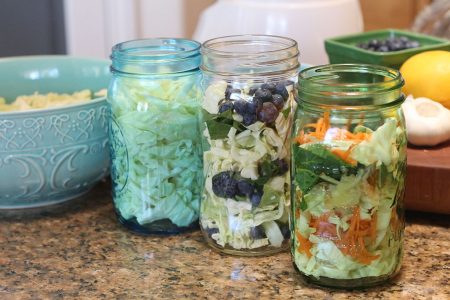 Are you convinced yet?! Want to know how to make them? Let's get started. Grab some canning jars and veggies and head on over to the How to Make Cultured Vegetables page.
Are you convinced yet?! Want to know how to make them? Let's get started. Grab some canning jars and veggies and head on over to the How to Make Cultured Vegetables page.
Listen To My Podcast
Forget everything you think you know about vegetables and let me tell you what happens when you culture them. Grow your own probiotics in a jar of vegetables, and you’ll be shocked and amazed at everything they can do. My life was dramatically changed by a jar of cultured vegetables that was teeming with billions of probiotics. Cultured veggies continue to amaze me and fill me with wonder, but the help they provide can far surpass the things I have seen in myself and countless others. Check out this week's podcast to learn more.
References I talked about:
Are you on the list?
Sign up today and I'll send you my free Getting Started Guide!
Each week I'll send you updates, tips, recipes, and more! You might even be a winner of my weekly giveaway! (starter cultures, memberships, and more!)
Come be a part of my cultured food family!

